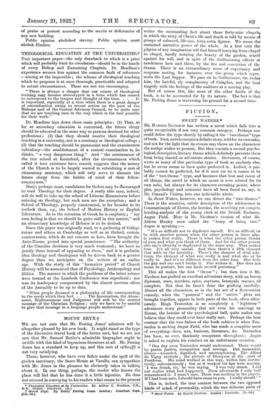THEOLOGICAL EDUCATION AT THE TJNIVERSrTIES.* THIS important paper—the only drawback
to which is a price which will probably limit its circulation—should be in the hands of every Bishop and Examining Chaplain. Dr. Headlam's experience secures him against the common fault of reformers —aiming at the impossible ; the scheme of theological teaching which he proposes is at once thorough, practicable and adapted to actual circumstances. These are not too encouraging.
" There is always a danger that our course of theological training may become stereotyped in a form which has ceased to correspond to the temper and thought of the time. . . . It is important, especially at a time when there is a great danger of centralization owing to recent action on the part of the Bishops and of the Central Advisory Council, to be quite sure that we are teaching men in the way which is the best possible for their work."
Dr. Headlam lays down three main principles : (1) That, so far as secondary education is concerned, the future clergy should be educated in the same way as persons destined for other professions ; (2) that they should receive their theological teaching in a university, not in a seminary or theological college ; (3) that the teaching should be paramount and the examination subsidiary—the establishment of a central examination is, he thinks, " a very dangerous thing." And " the continuance of the test school at Knutsforyl, after the circumstances which called it into existence have ceased, suggests that the money of the Church is to be largely wasted in subsidizing a sort of elementary seminary, which will only serve to alienate the future clergy from the habits of mind of their fellow- countrymen."
Many, perhaps most, candidates for Orders may be encouraged to read Theology for their degree. A really able man, indeed, will do well to take up the school of Litterae Humaniores before entering on theology, but such men are the exception ; and a School of Theology, properly constructed, is far broader in its
outlook than, e.g., the School of Modern History or English Literature. As to the retention of Greek he is emphatic ; " my own feeling is that we should be quite stiff in this matter," and
an elementary knowledge of Hebrew is to be desired,
Since this paper was originally read, to a gathering of College tutors and others at Cambridge as well as at Oxford, certain
controversies, which do not concern us here, have brought the Ante-Nicene period into special prominence. " The authority
of the Conciliar decisions is very much weakened ; we have to justify them instead of appealing to them," and it is probable that theology and theologians will be driven back to a greater
degree than we anticipate on the writers of an earlier age. With the study of this "formative period" of Church
History will be associated that of Psychology, Anthropology and Ethics. The manner in which the problems of the latter science were treated at the Lambeth Conference was superficial ; nor was its inadequacy compensated by the almost nervous effort of the Assembly to be up to date.
" What people demand is a philosophy of life corresponding to the needs which they feel. . . . The Incarnation, the Atone- ment, Righteousness and Judgment will still be the central message of the Christian Religion ; only we have to be careful to give that message in a language people understand."


































 Previous page
Previous page